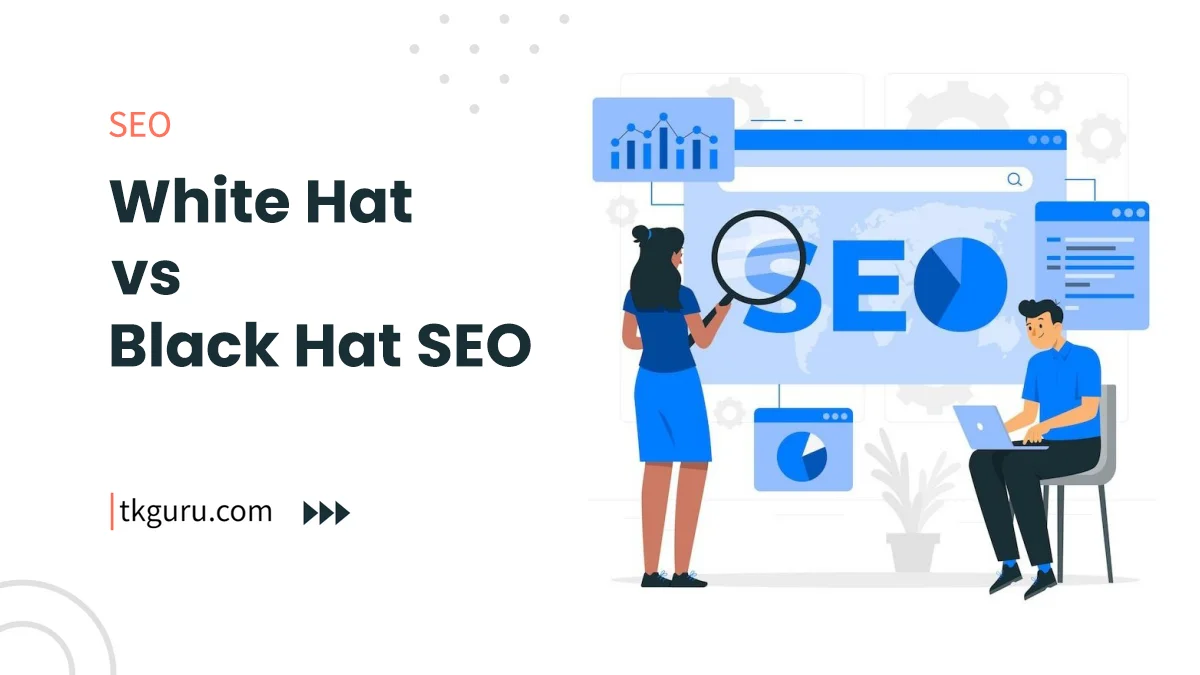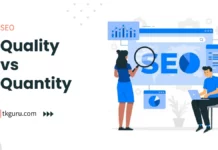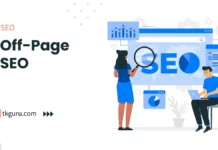Advertisements
Ratings

White Hat vs Black Hat SEO – Search Engine Optimization (SEO) serves as the compass guiding websites through the vast digital landscape. Within this realm, the ethical choices between White Hat and Black Hat SEO practices significantly impact a website’s trajectory.
In this comprehensive article, we will delve into the theoretical and practical aspects of these practices, exploring the principles, strategies, and consequences of each.
By understanding the ethical differences and implications of White Hat and Black Hat SEO, you can navigate the path towards sustained success with clarity.
Contents
1. White Hat SEO: Ethical Optimization Strategies
A. Definition and Principles of White Hat SEO
White Hat SEO epitomizes ethical, sustainable, and user-centric optimization strategies that align with search engine guidelines. The principles of transparency, honesty, and long-term value creation drive this approach.
B. On-Page Optimization
Effective on-page optimization serves as the cornerstone of White Hat SEO, creating a solid foundation for user engagement and search engine visibility.
| On-Page Optimization Strategies | Explanation | Data (Theoretical) |
|---|---|---|
| Content relevance and quality | Develop high-quality, informative content that resonates with user intent. | Content that addresses user queries tends to have a higher chance of ranking well. |
| Proper HTML structure and meta information | Craft clear title tags, meta descriptions, and heading tags for improved search engine understanding. | Pages with well-structured HTML are more likely to be crawled accurately by search engines. |
C. Quality Link Building
White Hat SEO places great importance on the ethical acquisition of high-quality backlinks, which not only improves authority but also enhances user experience.
| Quality Link Building Strategies | Explanation | Data (Theoretical) |
|---|---|---|
| Natural link acquisition through valuable content | Create content that serves user needs, naturally attracting authoritative backlinks. | Pages with valuable and informative content are more likely to earn organic backlinks. |
| Building relationships and earning authoritative backlinks | Cultivate relationships with influencers and reputable websites to earn genuine backlinks. | Collaborations with respected industry figures often lead to higher-quality backlinks. |
D. Technical SEO Best Practices
Technical SEO ensures a smooth user experience, enabling search engines to crawl and index content effectively.
| Technical SEO Best Practices | Explanation | Data (Theoretical) |
|---|---|---|
| Optimizing site speed and mobile-friendliness | Improve loading times and responsiveness for better user satisfaction. | Pages with faster load times tend to have lower bounce rates and higher conversion rates. |
| Clean URL structures and proper redirects | Employ clean, descriptive URLs and redirects to maintain a clear site structure. | User-friendly URLs enhance user experience and contribute to improved rankings. |
E. User Experience Enhancement
Enhancing user experience is a central tenet of White Hat SEO, focusing on delivering value and convenience to users.
| User Experience Enhancement Strategies | Explanation | Data (Theoretical) |
|---|---|---|
| Ensuring intuitive navigation and responsive design | Prioritize user-centric design for seamless navigation and optimal display across devices. | Websites with responsive design tend to have higher engagement and lower bounce rates. |
| Focusing on user engagement metrics | Monitor metrics like bounce rate, time on page, and conversion rates to gauge user satisfaction. | Higher user engagement metrics correlate with better search rankings and user experiences. |
2. Black Hat SEO: Unethical Manipulations
A. Definition and Characteristics of Black Hat SEO
Black Hat SEO entails unethical practices that manipulate search engines for quick gains, often at the cost of user experience and long-term growth.
B. Keyword Stuffing and Hidden Content
| Black Hat Tactics | Explanation | Data (Theoretical) |
|---|---|---|
| Keyword Stuffing | Overloading content with irrelevant keywords to manipulate search rankings. | Keyword stuffing can lead to penalties and a negative impact on user experience. |
| Hidden Content | Displaying content invisible to users but visible to search engines, deceiving both parties. | Hidden content may result in search engine penalties and user dissatisfaction. |
C. Link Schemes and Manipulations
| Black Hat Tactics | Explanation | Data (Theoretical) |
|---|---|---|
| Acquiring low-quality and irrelevant backlinks | Engaging in link schemes to artificially inflate rankings with low-quality backlinks. | Low-quality backlinks can lead to penalties and a decrease in search rankings. |
| Private blog networks (PBNs) and link buying | Building networks of websites solely for interlinking, against search engine guidelines. | PBNs and purchased links risk penalties and diminished credibility. |
D. Cloaking and Sneaky Redirects
| Black Hat Tactics | Explanation | Data (Theoretical) |
|---|---|---|
| Cloaking | Displaying different content to search engines and users, deceiving both parties. | Cloaking can result in penalties and a loss of user trust. |
| Sneaky Redirects | Redirecting users to unrelated or spammy sites, often without their knowledge. | Sneaky redirects can lead to search engine penalties and a poor user experience. |
E. Automated Content Generation
| Black Hat Tactics | Explanation | Data (Theoretical) |
|---|---|---|
| Automated Content Generation | Using automated tools to produce low-quality, nonsensical content. | Automated content is unlikely to engage users or contribute positively to SEO efforts. |
| Duplication and spinning of existing content | Creating duplicate or spun content for manipulation. | Duplicate content risks penalties and dilution of search engine rankings. |
3. Ethical Considerations and Long-Term Impact
A. Short-Term Gains vs Long-Term Sustainability
| Ethical Considerations | Explanation | Data (Theoretical) |
|---|---|---|
| Immediate benefits of Black Hat tactics | Black Hat SEO may offer quick gains but sacrifices long-term sustainability. | Quick gains often result in a lack of lasting success and may lead to penalties. |
| The risk of penalties, bans, and tarnished reputation | Black Hat tactics expose websites to penalties, bans, and reputation damage. | Search engine penalties can significantly impact a website’s visibility and credibility. |
B. Search Engine Penalties and Algorithm Updates
| Ethical Considerations | Explanation | Data (Theoretical) |
|---|---|---|
| How search engines identify and penalize Black Hat practices | Search engines employ algorithms and manual reviews to detect unethical practices. | Search engines penalize websites engaging in Black Hat tactics to maintain quality search results. |
| The continuous evolution of search engine algorithms | Algorithms evolve to counter Black Hat tactics, making them less effective over time. | Search engines continually refine their algorithms to combat manipulative practices. |
4. Consequences and Risks of Unethical SEO
A. Search Engine Penalties
| Consequences and Risks | Explanation | Data (Theoretical) |
|---|---|---|
| Algorithmic penalties and manual actions | Penalties can result in lowered rankings or complete removal from search results. | Websites can experience severe ranking drops or even disappear from search results due to penalties. |
| Dropped rankings and diminished organic traffic | Black Hat tactics can lead to substantial drops in search rankings and organic traffic. | Diminished search visibility directly affects organic traffic and website performance. |
B. Reputation Damage
| Consequences and Risks | Explanation | Data (Theoretical) |
|---|---|---|
| Negative impact on brand trust and credibility | Unethical practices can erode user trust and tarnish brand credibility. | Reputation damage can have lasting negative effects on a brand’s online presence. |
| Recovering from a tarnished online reputation | Rebuilding reputation is challenging and time-consuming, requiring transparent efforts. | Reputation recovery demands concerted efforts to regain user trust and credibility. |
Conclusion: Ethical Pathways to SEO Excellence
The ethical dichotomy between White Hat and Black Hat SEO practices shapes a website’s destiny in the digital realm.
By understanding the ethical considerations, practical implications, and consequences of each approach, webmasters and businesses can make informed decisions aligned with their values.
White Hat SEO cultivates sustainable growth, positive user experiences, and lasting reputation, whereas Black Hat SEO may offer fleeting gains but exposes websites to penalties and reputation damage.
Choosing the path of ethical optimization not only fosters long-term success but also contributes to a more credible and trustworthy digital ecosystem.
White Hat vs Black Hat SEOFAQs
What is White Hat SEO?
White Hat SEO refers to ethical and legitimate SEO practices that focus on optimizing a website for search engines while adhering to search engine guidelines and best practices.
It aims to improve search rankings through quality content, proper HTML optimization, and genuine backlink building.
What is Black Hat SEO?
Black Hat SEO involves using aggressive and unethical techniques to manipulate search engine rankings.
These tactics often violate search engine guidelines and can result in penalties or deindexing. Examples include keyword stuffing, cloaking, and buying low-quality backlinks.
What are some examples of White Hat SEO practices?
Examples of White Hat SEO practices include:
- Creating high-quality, relevant, and valuable content for users.
- Optimizing on-page elements like titles, headings, and meta descriptions.
- Building genuine, high-quality backlinks through outreach and networking.
- Providing a good user experience with a mobile-responsive design and fast loading times.
What are the risks of using Black Hat SEO tactics?
Black Hat SEO tactics can result in serious consequences, such as:
- Search engine penalties or deindexing.
- Loss of search rankings and organic traffic.
- Damage to online reputation and brand credibility.
Which approach should I choose, White Hat or Black Hat SEO?
It's highly recommended to choose White Hat SEO practices. While Black Hat tactics might offer short-term gains, they can lead to long-term negative consequences.
White Hat SEO focuses on building a sustainable online presence and providing value to users, leading to better results in the long run.
Choosing White Hat SEO aligns with ethical and sustainable practices that contribute to the overall health and success of your website and online presence.
It ensures you build a strong foundation for lasting search engine visibility and positive user experiences.
| Web Hosting | Website |
| WordPress | Google Adsense |
| SEO | Affiliate Marketing |
| Blogging | YouTube |
Recent Posts
- Top 6 SEO Companies in Ahmedabad 2024: Unlock Success with the Top SEO Companies in Ahmedabad
- Top 5 SEO Companies in Kanpur 2024: Discover the Top-Rated SEO Companies in Kanpur
- Quality vs Quantity: The Importance of High-Quality Backlinks
- E-A-T and SEO: Expertise, Authoritativeness, Trustworthiness
Related Tags
grey hat seo, white hat seo, write any two points of difference between white hat seo and black hat seo, black hat seo and white hat seo in hindi, write any two white hat strategies, white hat seo example, black hat seo example, white hat seo techniques






